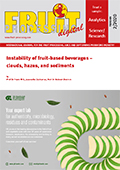Top five F&B innovations to watch out for in 2020
2020 will be a period of ground-breaking innovations in the food and beverage (F&B) sector, with a focus on health and sustainability, says GlobalData, a leading data and analytics company.

2020 will be a period of ground-breaking innovations in the food and beverage (F&B) sector, with a focus on health and sustainability, says GlobalData, a leading data and analytics company.
Hakan Demirci, Consumer Analyst at GlobalData, comments: “Over the last couple of years, we have seen vast strides in the development of technology for the F&B sector. This year is set to become a watershed year as these technological innovations experience an expansion in their application across the industry.”
With the year promising a flurry of innovations in the industry – from personalized nutrition to alternative proteins, GlobalData lists five of the top F&B trends to watch out for in 2020, ranked:
5) Personalized Nutrition:
“Personalized nutrition will aim to revolutionize consumption habits among health-conscious consumers using nutrigenomics. The future will see targeted nutrition accounting for both genetic and environmental factors, to maximize the nutritional value of certain diets for consumers.
“One example of this is a company called Sun Genomics, who are currently testing tailored probiotics by sequencing the human gut and analyzing the distribution of the different types of microbes.”
4) 3D Printed Food:
“While 3D-printed food has been around for quite some time, it is an expensive and time-intensive method of producing food. Nevertheless, in 2019, 3D printing of plant-based meat received heavy investment due to its efficiency in comparison to current methods of extrusion, and for its ability to replicate the texture of meat.
“Innovations in 3D-printing technology throughout 2020 will see an increase in speed to delivery, a reduction in costs and an expansion of the types of products that can be created using 3D printing.”
3) Alternative Proteins:
“As veganism continues to become mainstream, so too will efforts in replicating certain animal proteins. This will range from the development of egg white cell cultures to lab grown cultured meat – bypassing the impact on sentient animals.
“Throughout the year, we will see these methods replicating a more diverse and niche variety of meats. For example, Impossible Burgers released their first vegan pork in early January 2020.
“Moreover, investment in this sector will flourish in 2020 as a growing coterie of fast-food conglomerates pour funds into the research and development (R&D) of vegan alternatives to their own meat-based products.”
2) Traceability:
“The next decade will see the transparent documentation of a product’s life cycle. This will improve food safety, as potential bacteria-related hazards can be pinpointed for detection and eliminated with ease and speed. This will be achieved as technological innovations such as the Internet of Things (IoT) and blockchain improves in application and efficiency.
“For example, blockchain can map a products lifespan on the chain, providing a transparent chain of ownership for a particular asset. These records cannot be erased or altered, ensuring accountability throughout the whole process, an important aspect of transparency.”
1) Biotechnology:
“The advent of biomolecular sciences and improvements in genetic editing and sequencing will aid in the development of highly nutritious crops, with extended expiration dates and improving resistance against genetic and environmental diseases and infections.
“For example, a current innovation underway aims to improve the shelf life of melons with a non-GMO molecular breeding technique, seeking to halt the ripening process after cultivation whilst simultaneously preventing this from negatively impacting upon the taste of the final product.”









